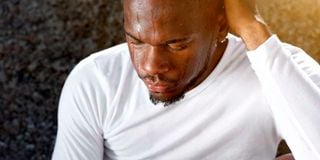Doc, is heavy sweating a sign of medical condition?

What you need to know:
- The condition cannot be cured but it can be managed. You should take a lot of water and wear cotton clothing.
- You can also apply aluminium chloride/chlorhydrate solution to the most affected areas prescribed by the doctor or from a chemist.
Doc, I am 23 years old. Ever since I can remember, after performing an activity of however little strain, I start sweating a lot. It gets worse with the degree of intensity in the activity to a point where I am drenched in sweat. What amount of sweating is considered normal, and if mine is abnormal, what can I do?
Dear Muriuki,
Sweating is one of the ways the body regulates excessive body heat. When the sweating is too much, in excess of what is needed for temperature regulation, it is called hyperhidrosis.
Hyperhidrosis can affect the whole body or specific sites such as the face and head (craniofacial hyperhidrosis), the palms (palmar hyperhidrosis), the armpits (axillary hyperhidrosis) or the feet (plantar/pedal hyperhidrosis). The excessive sweating is not considered dangerous. The constant wetness of the skin makes it easier to get other skin conditions like fungal infections, eczema and cracking.
The excessive sweating is usually due to overactive sweat glands because of miscommunication from the nerves. Most people have primary hyperhidrosis, which means that the sweating is not caused by any disease or infection.
It may be triggered by a part of the nervous system (neurological hyperhidrosis), by eating (gustatory hyperhidrosis) or have no obvious cause. In secondary hyperhidrosis, the sweating is due to another disease such as thyroid problem, diabetes, nervous system diseases or some medications. The child of a parent with hyperhidrosis has 25 per cent chance of suffering from the same. Hormonal changes and emotions can also trigger hyperhidrosis, for example, sweating when nervous.
The condition cannot be cured but it can be managed. You should take a lot of water and wear cotton clothing. You can also apply aluminium chloride/chlorhydrate solution to the most affected areas prescribed by the doctor or from a chemist. If the sweating continues to be excessive, you can be seen by a skin specialist, a dermatologist, for iontophoresis, which means that a mild electric current is passed to the most affected area through water. Some medications or injections may also be given by the dermatologist. In case another illness is suspected, the doctor will do the necessary checks to determine this.
Dear Doc, what are hemorrhoids?
Walji.
Dear Walji,
Hemorrhoids, otherwise known as piles, are veins that bulge or prolapse in the lower part of the rectum and anus. The walls of the veins stretch and get irritated, and easily get a tear and bleed especially when passing stool. The hemorrhoids may be on the outside around the anal opening or may “come out” when passing stool, and sometimes can be pushed back in. These are called external hemorrhoids. If there are far up inside that they cannot be seen or felt, they are called internal hemorrhoids. Symptoms include a painful or itchy swelling at the anal opening, and pain or bleeding when passing stool.
They can be caused by straining when passing stool, for instance due to constipation or diarrhoea; any activity that causes repeated high pressure in the abdominal region such as persistent cough and lifting weights. They are also more common in people who stand or sit for long periods of time, and also during pregnancy. Most of the time, they resolve easily with diet and lifestyle changes and with treatment though they can recur.
To manage the problem, try and prevent constipation by taking a lot of fluids and high fibre diet everyday, exercise, schedule time each day for a bowel movement, and take your time; use baby wipes or wash instead of using toilet paper to wipe after passing stool, and you can also take a sitz bath- sit in warm water for about 20min twice a day to help soothe the injured tissue.
There are fibre supplements which you can take to help with passing soft stools. There are other laxatives and stool softeners which can be prescribed by the doctor. There are creams and suppositories that can be used to help with the healing of the torn tissue. There are also oral tablets that are prescribed to heal the veins.
In case symptoms persist despite these measures, surgery may need to be done to correct the problem.
I am 30 years old. I have been experiencing persistent hair loss since the birth of my son, who is now five years old. I am afraid that I am going bald. Please assist and advice.
Monicah
Dear Monicah,
Hair goes through a growth phase and a resting phase after which it falls off and new hair starts to grow. On a normal day, we lose about 100 hairs. One of the benefits of pregnancy is that the hair may look fuller, shinier and longer than usual. This is because of the high levels of oestrogen in the body, which significantly reduce the rate of hair loss and increase the volume of blood in circulation. After pregnancy, the oestrogen levels drop significantly and blood flow goes back to normal. You end up shedding a lot of hair, about 300 strands per day, including the hair that was in the resting phase that was not shed during the pregnancy.
This is a normal part of the body recovering from pregnancy. It is usually at its worst about four months after delivery and the hair should have gone back to normal by the time the baby turns one year. There is no way to prevent the initial hair loss, though having a low blood level, or other illnesses like thyroid disease,can make the hair loss worse and last longer.
The other causes of hair loss include poor nutrition, hereditary factors, medical conditions, hormonal changes, medications, stress and some hair treatments and hairstyles. It is advisable for you to see a doctor since the hair loss has persisted for five years. In the meantime, be gentle with your hair, avoid prolonged exposure of the hair to direct sunlight, use volumizing shampoos (the ones with protein) and light conditioners, reduce heat treatments and any hair additions or treatments that may further hurt/weaken your hair. You can also opt to trim your hair or try hairstyles that make the hair look fuller. Take healthy balanced meals to facilitate the new growth of hair and treat any underlying illnesses.
Send your health questions to [email protected]




